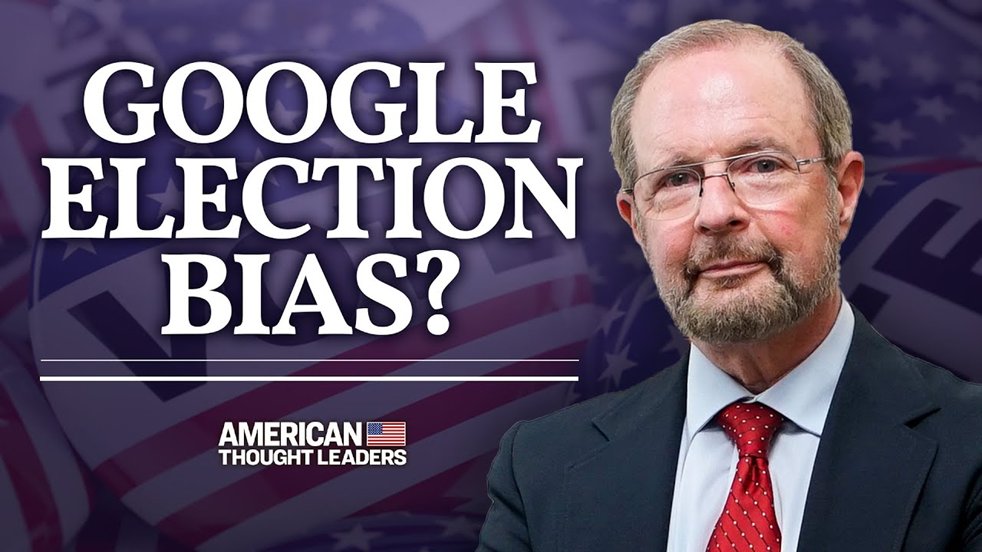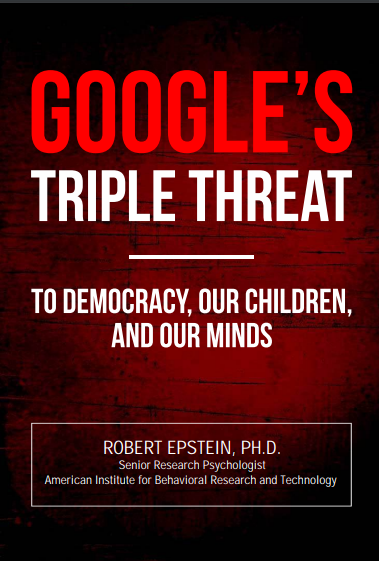 By Neenah Payne
By Neenah Payne
The 2024 Global Elections Super Cycle shows that national elections are being held in 52 countries this year.
The Ultimate Election Year: All the Elections Around the World in 2024 reports,
2024 is not just an election year. It’s perhaps the election year. Globally, more voters than ever in history will head to the polls as at least 64 countries (plus the European Union)—representing a combined population of about 49% of the people in the world—are meant to hold national elections, the results of which, for many, will prove consequential for years to come.
How this year of elections is set to reshape global politics explains,
Almost half of the world’s population will vote in national elections in 2024. Here’s what we’ve learned so far. Elections are taking place this year in countries home to almost half of the world’s population, from Taiwan’s general election in January to the U.S. presidential race in November.
Dr. Robert Epstein: Google’s Global Power
Robert Epstein is a senior research psychologist at the American Institute for Behavioral Research and Technology in California. A PhD of Harvard University, he is the author of 15 books and more than 250 scientific and mainstream articles, as well as the former editor-in-chief of Psychology Today.
Many Ways Google Threatens Everyone reported in May 2022 on Epstein’s exposé of Google then.
Sen. Ted Cruz’s 2020 Hearings on Big Tech
In his testimony before Senator Ted Cruz (R-TX), Dr. Epstein explained that Big Tech companies like Google, Facebook, and Twitter can shift as many as 15 million votes in an election without people’s knowledge and without leaving a paper trail.
Dr. Epstein’s must-read 51-page Google Triple Threat To Democracy, Our Children, and Our Minds is free online. Dr. Epstein says Google should be declared a public domain as were the telephone companies, electricity companies, etc. Epstein explains that Google tried to shut down Proton Mail. Google and other Big Tech companies violate campaign finance law when they support one party over another.
Specifically, Sen. Cruz discussed testimony from respected academic Dr. Robert Epstein, who testified in July of last year “that Google’s biased search results swung a minimum of 2.6 million votes to Hillary Clinton in 2016.” Dr. Epstein went on to say that, “in 2020 if all these companies are supporting the same candidate, there are 15 million votes on the line that can be shifted without people’s knowledge, and without leaving a paper trail for authorities to trace.”
The Atlantic: The New American Empire
The Rise and Rise of the Big Tech Empire
NYTimes: Big Tech Has Become Way Too Powerful
How Private Tech Companies Are Reshaping Great Power Competition
Problems With Google Search Results
Google Omits Trump Assassination Attempt! is a glaring example of how biased Google is. Problems with Google have led to several alternative search engines including BitChute and Rumble. Result Hunter: Search Engine For Conservatives discusses a new option. The government, media, and search engines should report facts without bias. Downfall of The Legacy Media explains that the corporate media is dying now as a growing number of people switch to alternative media for more trustworthy information.
Robert Epstein’s “digital shield” shows how tech giants manipulate voters
Get a free copy of “The Evidence” by Dr. Epstein. “If you want to better understand the unprecedented threats Google-and-the-Gang pose to our democracy, our children, and our minds, please visit techwatchproject.org”.
Shining a Light on Bigi Tech’s Darkk Secrets: Revealing Real-Time Ephemeral Manipulation. Big Tech companies use ephemeral content such as search result, “go-vote” reminders, and video recommendations to rig our elections, indoctrinate our children, and control our thinking. We are now preserving this kind of content – for the first time ever! – to give our courts and our nation’s leaders the evidence they need to force these companies to STOP their manipulations.
Dr. Epstein: Joe Rogan #1768
Dr. Epstein first appeared on the Joe Rogan show in Episode #1768. 6/27/24
Dr. Robert Epstein is an author, professor, and Senior Research Psychologist at American Institute for Behavioral Research and Technology: a non-profit, non-partisan organization that offers data regarding the power of Google and other Big Tech companies to censor dissenting opinions online and sway the outcome of elections.
How Google Controls Elections Worldwide
The new mind control: The internet has spawned subtle forms of influence that can flip elections and manipulate everything we say, think and do….Google decides which web pages to include in search results, and how to rank them. How it does so is one of the best-kept secrets in the world, like the formula for Coca-Cola’
To understand how the new forms of mind control work, we need to start by looking at the search engine – one in particular: the biggest and best of them all, namely Google. The Google search engine is so good and so popular that the company’s name is now a commonly used verb in languages around the world.
To ‘Google’ something is to look it up on the Google search engine, and that, in fact, is how most computer users worldwide get most of their information about just about everything these days. They Google it. Google has become the main gateway to virtually all knowledge, mainly because the search engine is so good at giving us exactly the information we are looking for, almost instantly and almost always in the first position of the list it shows us after we launch our search – the list of ‘search results’.
That ordered list is so good, in fact, that about 50 per cent of our clicks go to the top two items, and more than 90 per cent of our clicks go to the 10 items listed on the first page of results; few people look at other results pages, even though they often number in the thousands, which means they probably contain lots of good information….
Because people are far more likely to read and click on higher-ranked items, companies now spend billions of dollars every year trying to trick Google’s search algorithm – the computer program that does the selecting and ranking – into boosting them another notch or two. Moving up a notch can mean the difference between success and failure for a business, and moving into the top slots can be the key to fat profits.
Late in 2012, I began to wonder whether highly ranked search results could be impacting more than consumer choices. Perhaps, I speculated, a top search result could have a small impact on people’s opinions about things. Early in 2013, with my associate Ronald E Robertson of the American Institute for Behavioral Research and Technology in Vista, California, I put this idea to a test by conducting an experiment in which 102 people from the San Diego area were randomly assigned to one of three groups.…..
What we actually found was astonishing. The proportion of people favouring the search engine’s top-ranked candidate increased by 48.4 per cent, and all five of our measures shifted toward that candidate. What’s more, 75 per cent of the people in the bias groups seemed to have been completely unaware that they were viewing biased search rankings. In the control group, opinions did not shift significantly.
This seemed to be a major discovery.
The shift we had produced, which we called the Search Engine Manipulation Effect (or SEME, pronounced ‘seem’), appeared to be one of the largest behavioural effects ever discovered.
We did not immediately uncork the Champagne bottle, however. For one thing, we had tested only a small number of people, and they were all from the San Diego area.
Over the next year or so, we replicated our findings three more times, and the third time was with a sample of more than 2,000 people from all 50 US states. In that experiment, the shift in voting preferences was 37.1 per cent and even higher in some demographic groups – as high as 80 per cent, in fact.…..
SEME’s near-invisibility is curious indeed. It means that when people – including you and me – are looking at biased search rankings, they look just fine. So if right now you Google ‘US presidential candidates’, the search results you see will probably look fairly random, even if they happen to favour one candidate. Even I have trouble detecting bias in search rankings that I know to be biased (because they were prepared by my staff)….This is truly scary: like subliminal stimuli, SEME is a force you can’t see; but unlike subliminal stimuli, it has an enormous impact – like Casper the ghost pushing you down a flight of stairs.
We published a detailed report about our first five experiments on SEME in the prestigious Proceedings of the National Academy of Sciences (PNAS) in August 2015. We had indeed found something important, especially given Google’s dominance over search. Google has a near-monopoly on internet searches in the US, with 83 per cent of Americans specifying Google as the search engine they use most often, according to the Pew Research Center. So if Google favours one candidate in an election, its impact on undecided voters could easily decide the election’s outcome….
This high level of trust, combined with the lack of competition, puts Google in a unique position to impact elections. Even more disturbing, the search-ranking business is entirely unregulated, so Google could favour any candidate it likes without violating any laws. Some courts have even ruled that Google’s right to rank-order search results as it pleases is protected as a form of free speech.
Does the company ever favour particular candidates? In the 2012 US presidential election, Google and its top executives donated more than $800,000 to President Barack Obama and just $37,000 to his opponent, Mitt Romney. And in 2015, a team of researchers from the University of Maryland and elsewhere showed that Google’s search results routinely favoured Democratic candidates….
In most countries, 90 per cent of online search is conducted on Google, which gives the company even more power to flip elections than it has in the US and, with internet penetration increasing rapidly worldwide, this power is growing.
In our PNAS article, Robertson and I calculated that Google now has the power to flip upwards of 25 per cent of the national elections in the world with no one knowing this is occurring.
In fact, we estimate that, with or without deliberate planning on the part of company executives, Google’s search rankings have been impacting elections for years, with growing impact each year. And because search rankings are ephemeral, they leave no paper trail, which gives the company complete deniability.
Power on this scale and with this level of invisibility is unprecedented in human history. But it turns out that our discovery about SEME was just the tip of a very large iceberg.
Dr. Epstein on Joe Rogan in September 2024
Joe Rogan Experience #2201 – Robert Epstein 9/11/24
Robert Epstein is an author, editor, and psychology researcher. He is a former editor-in-chief of “Psychology Today” and currently serves as Senior Research Psychologist at the American Institute for Behavioral Research and Technology. He also founded the Cambridge Center for Behavioral Studies.
Neenah Payne writes for Activist Post.
Become a Patron!
Or support us at SubscribeStar
Donate cryptocurrency HERE
Subscribe to Activist Post for truth, peace, and freedom news. Follow us on Telegram, HIVE, Minds, MeWe, Twitter – X and Gab.
Provide, Protect and Profit from what’s coming! Get a free issue of Counter Markets today.


Be the first to comment on "Google’s Threat To Elections Worldwide"